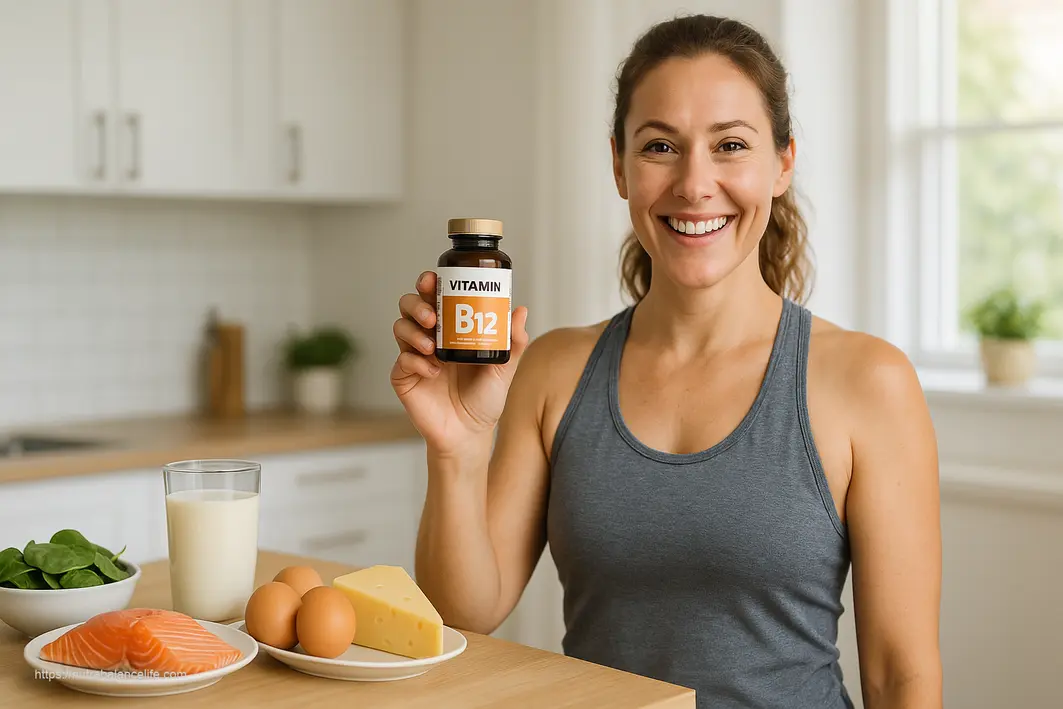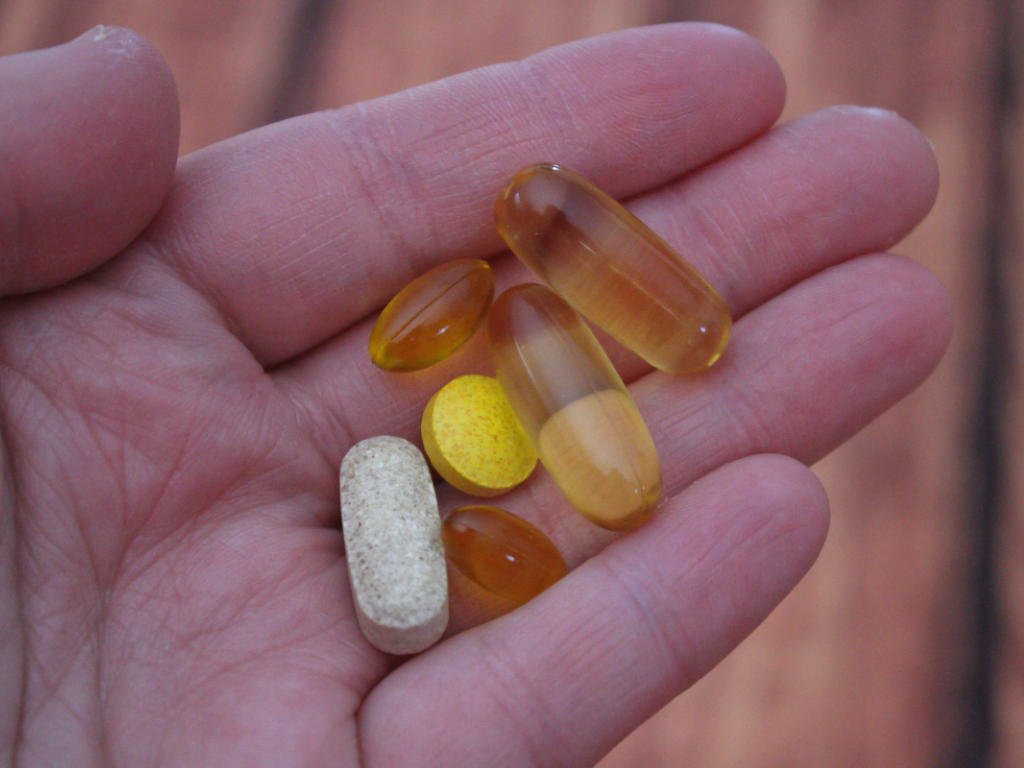Table of Contents
Ever wondered why some people seem to have boundless energy while others struggle with constant fatigue? The answer might lie in a tiny but mighty nutrient called Vitamin B12. Vitamin B12 benefits extend far beyond just preventing tiredness – this essential vitamin plays a crucial role in keeping your entire body functioning at its best.
Whether you’re a busy professional trying to maintain peak performance, a fitness enthusiast looking to optimize your recovery, or someone simply wanting to feel more energetic throughout the day, understanding Vitamin B12 could be the game-changer you’ve been searching for.
What Exactly Is Vitamin B12 and Why Does Your Body Need It?
Vitamin B12, also known as cobalamin, is one of those nutrients that quietly works behind the scenes to keep you healthy. It’s a water-soluble vitamin that your body can’t produce on its own – which means you absolutely must get it from your diet or supplements.
Think of B12 as your body’s multitasking superhero. It’s involved in everything from creating DNA (the instruction manual for your cells) to forming red blood cells and keeping your nervous system running smoothly. Without adequate B12, your body simply can’t perform these critical functions properly.
What makes B12 particularly interesting is that it comes in several forms:
- Methylcobalamin and 5-deoxyadenosylcobalamin – these are the active forms your body can use immediately
- Hydroxycobalamin and cyanocobalamin – inactive forms that need to be converted before your body can use them
Most supplements contain cyanocobalamin because it’s stable and cost-effective, but your body has to do the extra work of converting it to the active forms.
How Does Vitamin B12 Actually Boost Your Energy?
Here’s where things get really interesting. You’ve probably heard people say that B12 gives you energy, but it’s not quite like drinking a cup of coffee. Vitamin B12 benefits for energy work at a much deeper, cellular level.
B12 helps your body convert the food you eat – particularly proteins and fats – into usable energy. But here’s the kicker: it also plays a vital role in creating healthy red blood cells. These cells are like tiny delivery trucks that carry oxygen throughout your body.
When you don’t have enough B12, your red blood cells become large and misshapen (a condition called megaloblastic anemia). These oversized cells can’t carry oxygen efficiently, leaving you feeling tired and weak even when you’re getting plenty of sleep.
It’s like having a delivery service with broken-down trucks – the packages (oxygen) just can’t get where they need to go efficiently. That’s why people with B12 deficiency often experience that bone-deep fatigue that rest just doesn’t seem to fix.
The Surprising Ways Vitamin B12 Supports Your Overall Health
Brain Function and Nervous System Support

Your brain and nervous system are absolutely dependent on adequate B12 levels. This vitamin helps produce myelin, which is essentially the protective coating around your nerve fibers. Without proper myelin, nerve signals get scrambled – like trying to make a phone call with damaged wires.
Research suggests that Vitamin B12 benefits for brain health include:
- Supporting memory and cognitive function
- Helping maintain mood stability
- Potentially reducing the risk of age-related mental decline
- Supporting the production of important neurotransmitters
Some studies have even linked low B12 levels to increased risk of depression and anxiety, though more research is needed to fully understand these connections.
DNA Synthesis and Cell Division
Every single day, your body creates millions of new cells. Whether it’s healing a cut, growing hair, or replacing old skin cells, this constant renewal process requires adequate B12 for proper DNA synthesis.
Without enough B12, cell division becomes impaired, which can affect everything from wound healing to maintaining healthy skin, hair, and nails. It’s like trying to photocopy important documents with a broken copier – you might get results, but they won’t be quite right.
Heart Health and Homocysteine Regulation
Here’s something many people don’t know: B12 works together with folate and B6 to help regulate homocysteine levels in your blood. Homocysteine is an amino acid that, when elevated, may increase the risk of heart disease and stroke.
While the relationship between homocysteine and heart health is still being studied, maintaining adequate B12 levels appears to be one piece of the cardiovascular health puzzle.
Where Can You Actually Get Vitamin B12?
This is where things get a bit tricky, especially if you follow a plant-based diet. Vitamin B12 occurs naturally almost exclusively in animal products. Your best food sources include:
Excellent sources:
- Clams (they’re absolutely loaded with B12)
- Beef liver
- Fish like salmon, tuna, and sardines
- Lamb and beef
Good sources:
- Dairy products (milk, yogurt, cheese)
- Eggs
- Poultry
- Fortified nutritional yeast
Fortified options for vegetarians and vegans:
- Plant-based milks (soy, oat, almond)
- Fortified breakfast cereals
- Some meat alternatives
- B12-fortified nutritional yeast
The recommended daily amount for most adults is 2.4 micrograms, which might sound tiny, but it’s crucial. Pregnant and breastfeeding women need slightly more – about 2.6 to 2.8 micrograms daily.
Who’s Most at Risk for B12 Deficiency?
While anyone can develop B12 deficiency, certain groups are at higher risk:
Vegetarians and Vegans
Since B12 is primarily found in animal products, people following plant-based diets need to be particularly mindful. If you’re vegetarian or vegan, supplementation or carefully choosing fortified foods is usually necessary.
Older Adults (50+)
As we age, our ability to absorb B12 from food decreases. This happens because stomach acid production often declines with age, and you need adequate stomach acid to separate B12 from the proteins it’s bound to in food.
People with Digestive Issues
Conditions like Crohn’s disease, celiac disease, or having had gastric surgery can interfere with B12 absorption. Even something as common as taking certain medications (like proton pump inhibitors for acid reflux) can reduce B12 absorption over time.
Those Taking Certain Medications
Metformin (for diabetes) and some acid-reducing medications can interfere with B12 absorption when taken long-term.
Recognizing the Signs of B12 Deficiency
B12 deficiency can be sneaky – symptoms often develop gradually and can be mistaken for other conditions. Here’s what to watch for:
Physical symptoms:
- Persistent fatigue and weakness
- Pale skin
- Shortness of breath
- Cold hands and feet
- Strange sensations like numbness or tingling
Neurological symptoms:
- Memory problems
- Difficulty concentrating
- Mood changes or irritability
- Balance issues
- In severe cases, confusion or dementia-like symptoms
Blood-related symptoms:
- Signs of anemia (pale skin, rapid heartbeat, dizziness)
- Enlarged red blood cells (shown in blood tests)
If you’re experiencing several of these symptoms, especially if you’re in a high-risk group, it’s worth talking to your healthcare provider about getting your B12 levels tested.
Should You Consider B12 Supplements?
For many people, getting enough B12 from food alone is totally doable. But supplements can be a smart choice if you:
- Follow a vegetarian or vegan diet
- Are over 50
- Have digestive issues that affect absorption
- Take medications that interfere with B12 absorption
- Have been diagnosed with B12 deficiency
B12 supplements are generally very safe because it’s water-soluble – your body will excrete excess amounts rather than storing them. However, it’s always best to work with a healthcare provider to determine if you need supplementation and what dose is right for you.
The Connection Between B12 and Athletic Performance
If you’re into fitness, you might be wondering about Vitamin B12 benefits for athletic performance. While B12 won’t turn you into a superhero overnight, adequate levels are essential for:
- Optimal oxygen delivery to muscles
- Proper energy metabolism
- Recovery and muscle repair
- Maintaining steady energy levels during workouts
Some athletes swear by B12 injections, but for most people with normal B12 levels, additional supplementation won’t provide extra performance benefits. It’s more about ensuring you’re not deficient rather than loading up on extra amounts.
Speaking of fitness and energy, if you’re looking to optimize your overall wellness routine, you might want to check out these game-changing stress management techniques that can work alongside proper nutrition to boost your energy levels.
Debunking Common B12 Myths
Myth 1: “More B12 always means more energy”
Reality: If your B12 levels are normal, taking extra won’t give you more energy. The energy boost people often experience comes from correcting a deficiency, not from mega-dosing.
Myth 2: “You can get B12 from plants”
Reality: While some algae and fermented foods contain B12-like compounds, they’re often not in a form your body can use effectively. Reliable plant sources are fortified foods, not naturally occurring sources.
Myth 3: “B12 shots are always better than pills”
Reality: For most people, oral supplements work just fine. Injections are typically only necessary if you have severe absorption issues.
Myth 4: “Young people don’t need to worry about B12”
Reality: While deficiency is more common in older adults, young people following restrictive diets or with certain health conditions can also be at risk.
Making B12 Work for Your Lifestyle
For Meat Eaters
If you regularly eat animal products, you’re probably getting enough B12. Focus on including a variety of sources like fish, dairy, and lean meats in your diet.
For Vegetarians
Include eggs and dairy products regularly, and consider fortified foods like nutritional yeast or plant-based milks. A supplement might be wise for extra insurance.
For Vegans
Supplementation is usually necessary, along with regular consumption of fortified foods. Don’t rely on fortified foods alone – they can be inconsistent.
For Older Adults
Talk to your doctor about whether you should have your B12 levels tested. Many older adults benefit from supplements, even if they eat plenty of animal products.
Frequently Asked Questions About Vitamin B12
Can you take too much Vitamin B12?
B12 is water-soluble, so excess amounts are typically excreted in urine rather than stored. However, extremely high doses aren’t necessary for most people and may interact with certain medications.
How long does it take to see results from B12 supplementation?
If you’re deficient, you might start feeling more energetic within a few days to weeks. However, correcting severe deficiency, especially neurological symptoms, can take several months.
Are B12 energy drinks effective?
While they contain B12, they’re often loaded with caffeine and sugar. The energy boost you feel is likely from these ingredients rather than the B12 itself.
Can stress affect B12 absorption?
Chronic stress can affect digestion and potentially impact nutrient absorption, including B12. Managing stress through techniques like those found in effective stress management strategies can support overall nutrient absorption.
The Bottom Line on Vitamin B12 Benefits
Vitamin B12 benefits are far-reaching and essential for maintaining optimal health. From supporting energy production and brain function to preventing anemia and supporting DNA synthesis, this vital nutrient truly is a cornerstone of wellness.
While most people eating a varied diet including animal products will get enough B12, certain groups need to pay special attention to their intake. If you’re vegetarian, vegan, over 50, or have digestive issues, it’s worth discussing B12 with your healthcare provider.
Remember, B12 isn’t a magic bullet for energy – it’s more like a foundation that allows your body to function properly. When that foundation is solid, everything else works better.
The key is consistency rather than mega-doses. Whether through food, fortified products, or supplements, ensuring adequate B12 intake is one of the simplest yet most impactful things you can do for your long-term health.
Are you getting enough B12 in your diet? If you’re not sure, consider tracking your intake for a few days or talking to a healthcare provider about testing your levels. Your future self – and your energy levels – will thank you for taking this simple but crucial step toward optimal health.
For more insights on optimizing your overall wellness routine, explore our complete guide to general health and discover how proper nutrition fits into your broader health strategy.




